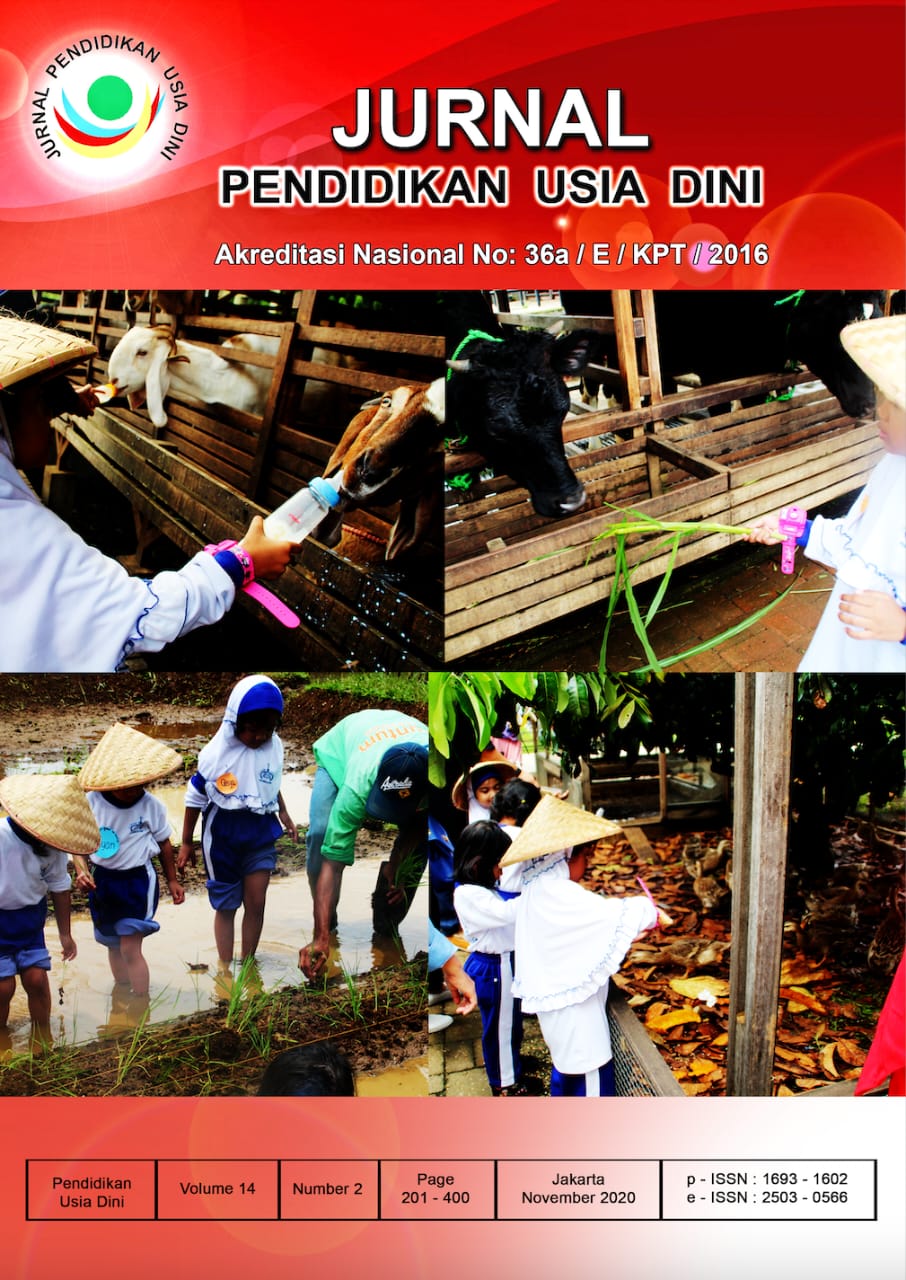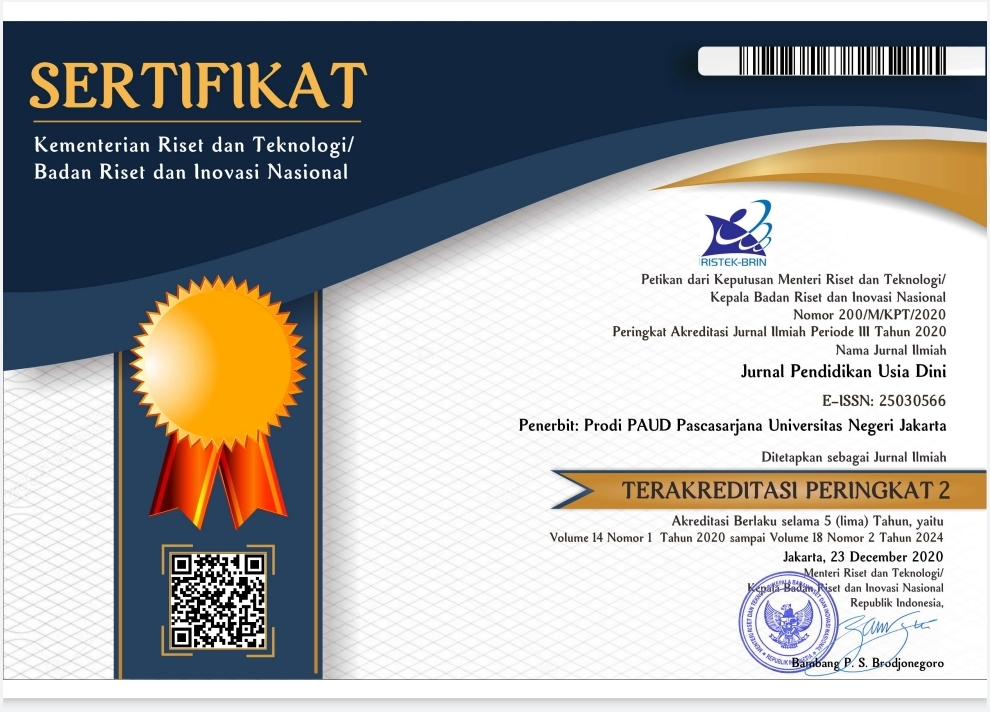Parenting E-book: Coping Early Childhood Education Problems During Learning from Home
DOI:
https://doi.org/10.21009/JPUD.142.11Abstract
During COVID-19, early-childhood school closings led to higher levels of stress in parents when compared to childless adults. In addition, lack of time to prepare, as well as mental-health problems, worry, and stress in parenting, may have hampered parents' ability to support their children's educational needs. The research aims to solve the problem of early childhood parenting during learning from home and improve the quality of early childhood parenting. The research method uses the research and development stage of the Borg & Gall model. Participants are mothers who have children aged 5-6 years. The data collection technique was done through expert validation and effectiveness testing with a quasi-experimental design. The data analysis used paired t-test statistical analysis. The findings show that the validity of the results of the material expert's test is 96%, and the media expert's test is 94% in the very good category. The effectiveness test based on the pre-test and post-test results showed that Sig. (2-tailed) <0,05 (α), which means that the parenting e-book media significantly increases mothers' understanding of parenting well-being practices in early childhood. The implications of this multimedia-based anyflip e-book can be downloaded via gadgets, android, laptop, practical, easy to read and repeated to accompany childcare activities from home.
Keywords: Anyflip E-book, Early Childhood, Parenting
References
Banerjee, A., Hanna, R., Kyle, J., Olken, B. A., & Sumarto, S. (2019). Private Outsourcing and Competition: Subsidized Food Distribution in Indonesia. Journal of Political Economy, 127(1), 101–137. https://doi.org/10.1086/700734
Borg, W. R., & Gall, M. D. (2007). Educational Research an Introduction. Fourth Edition. Bacon Publishing.
Bruni, O., Sette, S., Fontanesi, L., Baiocco, R., Laghi, F., & Baumgartner, E. (2015). Technology Use and Sleep Quality in Preadolescence and Adolescence. Journal of Clinical Sleep Medicine, 11(12), 1433–1441. https://doi.org/10.5664/jcsm.5282
de Jong, E., Visscher, T., HiraSing, R., Heymans, M., Seidell, J., & Renders, C. (2013). Association between TV viewing, computer use and overweight, determinants and competing activities of screen time in 4- to 13-year-old children. International Journal of Obesity, 7.
Dong, C., Cao, S., & Li, H. (2020). Young children’s online learning during COVID-19 pandemic: Chinese parents’ beliefs and attitudes. Children and Youth Services Review, 118, 105440. https://doi.org/10.1016/j.childyouth.2020.105440
Ebert, S. (2020). Theory of mind, language, and reading: Developmental relations from early childhood to early adolescence. Journal of Experimental Child Psychology, 191, 104739. https://doi.org/10.1016/j.jecp.2019.104739
Evans, M. A., Nowak, S., Burek, B., & Willoughby, D. (2017). The effect of alphabet eBooks and paper books on preschoolers’ behavior: An analysis over repeated readings. Early Childhood Research Quarterly, 40, 1–12. https://doi.org/10.1016/j.ecresq.2017.02.002
Fry, A. (2020). Use patterns for ebooks: The effects of subject, age and availability on rate of use. The Journal of Academic Librarianship, 46(3), 102150. https://doi.org/10.1016/j.acalib.2020.102150
Gerber, L. A., Guggenheim, M., Pang, Y. C., Ross, T., Mayevskaya, Y., Jacobs, S., & Pecora, P. J. (2020). Understanding the effects of an interdisciplinary approach to parental representation in child welfare. Children and Youth Services Review, 116, 105163. https://doi.org/10.1016/j.childyouth.2020.105163
Lau, E. Y. H., & Lee, K. (2020). Parents’ Views on Young Children’s Distance Learning and Screen Time During COVID-19 Class Suspensio. Early Education and Development, 19. https://doi.org/10.1080/10409289.2020.1843925
Lee, S. J., Ward, K. P., Chang, O. D., & Downing, K. M. (2021). Parenting activities and the transition to home-based education during the COVID-19 pandemic. Children and Youth Services Review, 122, 105585. https://doi.org/10.1016/j.childyouth.2020.105585
Morawska, A., Dittman, C. K., & Rusby, J. C. (2019). Promoting Self-Regulation in Young Children: The Role of Parenting Interventions. Clinical Child and Family Psychology Review, 22(1), 43–51. https://doi.org/10.1007/s10567-019-00281-5
Mourlam, D. J., DeCino, D. A., Newland, L. A., & Strouse, G. A. (2020). “It’s fun!” using students’ voices to understand the impact of school digital technology integration on their well-being. Computers & Education, 159, 104003. https://doi.org/10.1016/j.compedu.2020.104003
Nuñez, B., Stuart-Cassel, V., & Temkin, D. (2020). As COVID-19 spreads, most states have laws that address how schools should respond to pandemics. 66.
Paredes, E., Hernandez, E., Herrera, A., & Tonyan, H. (2020). Putting the “family” in family childcare: The alignment between familismo (familism) and family childcare providers’ descriptions of their work. Early Childhood Research Quarterly, 52, 74–85. https://doi.org/10.1016/j.ecresq.2018.04.007
Rosen, L. D., Felice, K. T., & Walsh, T. (2020). Whole health learning: The revolutionary child of integrative health and education. EXPLORE, 16(4), 271–273. https://doi.org/10.1016/j.explore.2020.05.003
Thomas, V., De Backer, F., Peeters, J., & Lombaerts, K. (2019). Parental involvement and adolescent school achievement: The mediational role of self-regulated learning. Learning Environments Research, 22(3), 345–363. https://doi.org/10.1007/s10984-019-09278-x
Tran, T., Hoang, A.-D., Nguyen, Y.-C., Nguyen, L.-C., Ta, N.-T., Pham, Q.-H., Pham, C.-X., Le, Q.-A., Dinh, V.-H., & Nguyen, T.-T. (2020). Toward Sustainable Learning during School Suspension: Socioeconomic, Occupational Aspirations, and Learning Behavior of Vietnamese Students during COVID-19. Sustainability, 12(10), 4195. https://doi.org/10.3390/su12104195
Troseth, G. L., & Strouse, G. A. (2017). Designing and using digital books for learning: The informative case of young children and video. International Journal of Child-Computer Interaction, 12, 3–7. https://doi.org/10.1016/j.ijcci.2016.12.002
UNESCO, U. (2020). COVID-19 impact on education. United Nations Educational Scientific and Cultural Organization. https://en. unesco.org/covid19/educationresponse
Webster, E. K., Martin, C. K., & Staiano, A. E. (2019). Fundamental motor skills, screen-time, and physical activity in preschoolers. Journal of Sport and Health Science, 8(2), 114–121. https://doi.org/10.1016/j.jshs.2018.11.006
Downloads
Published
How to Cite
Issue
Section
License
JURNAL PENDIDIKAN USIA DINI work is licensed under a Creative Commons Attribution 4.0 International License. (http://creativecommons.org/licenses/by/4.0/)





